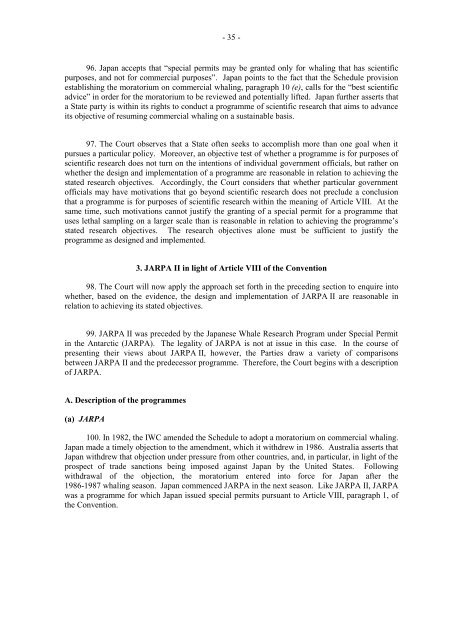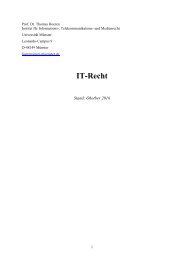3d4yVkKMl
3d4yVkKMl
3d4yVkKMl
Create successful ePaper yourself
Turn your PDF publications into a flip-book with our unique Google optimized e-Paper software.
- 35 -<br />
96. Japan accepts that “special permits may be granted only for whaling that has scientific<br />
purposes, and not for commercial purposes”. Japan points to the fact that the Schedule provision<br />
establishing the moratorium on commercial whaling, paragraph 10 (e), calls for the “best scientific<br />
advice” in order for the moratorium to be reviewed and potentially lifted. Japan further asserts that<br />
a State party is within its rights to conduct a programme of scientific research that aims to advance<br />
its objective of resuming commercial whaling on a sustainable basis.<br />
97. The Court observes that a State often seeks to accomplish more than one goal when it<br />
pursues a particular policy. Moreover, an objective test of whether a programme is for purposes of<br />
scientific research does not turn on the intentions of individual government officials, but rather on<br />
whether the design and implementation of a programme are reasonable in relation to achieving the<br />
stated research objectives. Accordingly, the Court considers that whether particular government<br />
officials may have motivations that go beyond scientific research does not preclude a conclusion<br />
that a programme is for purposes of scientific research within the meaning of Article VIII. At the<br />
same time, such motivations cannot justify the granting of a special permit for a programme that<br />
uses lethal sampling on a larger scale than is reasonable in relation to achieving the programme’s<br />
stated research objectives. The research objectives alone must be sufficient to justify the<br />
programme as designed and implemented.<br />
3. JARPA II in light of Article VIII of the Convention<br />
98. The Court will now apply the approach set forth in the preceding section to enquire into<br />
whether, based on the evidence, the design and implementation of JARPA II are reasonable in<br />
relation to achieving its stated objectives.<br />
99. JARPA II was preceded by the Japanese Whale Research Program under Special Permit<br />
in the Antarctic (JARPA). The legality of JARPA is not at issue in this case. In the course of<br />
presenting their views about JARPA II, however, the Parties draw a variety of comparisons<br />
between JARPA II and the predecessor programme. Therefore, the Court begins with a description<br />
of JARPA.<br />
A. Description of the programmes<br />
(a) JARPA<br />
100. In 1982, the IWC amended the Schedule to adopt a moratorium on commercial whaling.<br />
Japan made a timely objection to the amendment, which it withdrew in 1986. Australia asserts that<br />
Japan withdrew that objection under pressure from other countries, and, in particular, in light of the<br />
prospect of trade sanctions being imposed against Japan by the United States. Following<br />
withdrawal of the objection, the moratorium entered into force for Japan after the<br />
1986-1987 whaling season. Japan commenced JARPA in the next season. Like JARPA II, JARPA<br />
was a programme for which Japan issued special permits pursuant to Article VIII, paragraph 1, of<br />
the Convention.



